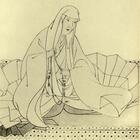
Abutsu ni (c. 1222-1283), known before taking the habit as Ankamon-in no Shijō, was born into a Kyoto court family. At the age of fourteen he entered the service of Princess Ankamon in, whom he assisted for five years and with whom he always maintained close contact until his death. Under his tutelage, she gained experience as a poet and scholar. Subsequently, Abutsu entered Hokkeji Temple as a novice and continued to deepen her knowledge of classical literature. At the age of thirty, she married the celebrated poet Fujiwara no Tameie, to whom she bore three children. In 1275, Tameie's death sowed controversy between Abutsu's sons, on the one hand, and the children of Tameie's first marriage, on the other, regarding the inheritance and poetic legacy of the Mikohidari house. In 1279, Abutsu moved to Kamakura to sue for the inheritance rights of his children. The result of this trip is Diary of the Waning Moon, an exquisite testimony that underlines the author's devotion to her family and poetry. Abutsu also wrote A Light Sleep or in the Sleep, the delicate autobiographical account of a broken young man included in the present volume, and Yoru no Tsuru, the first poetic treatise written by a woman. Abutsu is a leading figure in Japanese literature and is part of the Sanjūrokkasen or Thirty-six Immortal Poets.




